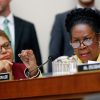Living the Legacy of Our History:
Resolutions for Righteous and Relentless Struggle
In this time of trial, tragedy and transition, let us turn inward for a sustaining strength and still wish, work and struggle for good in the world. Even though we might have made New Year’s resolutions in all honesty, the established order cultivates a climate that makes them soon lose their relevance and reality. And it can systematically urge us to move on to the TV spectacles, tech toys and false hopes that divert us and make too many of us avoid the serious, dismiss, deny or downplay the suffering of others, and seek the comfortable places in oppression posed as the sensible, safe and “normal” thing to do.
But our history as a people asks and demands more of us, especially in this time of admitted madness, publicly advocated and practiced meanness, and shameless prior presidential boasts of larger capacity to kill and lay waste the world. And then, of course, there is the enduring savage and subtle racism, vampire and vulture capitalism, and predatory sexism here and around the world. As an African people, we know our oppressor must not be our teacher and that at the heart of all we do must be the ancient African moral imperative and practice to do good everywhere, and to bear witness to truth and set the scales of justice in their proper place among those who have no voice, i.e., the vulnerable, devalued, and oppressed.
So, in the tradition of our ancestors, we are obligated to keep the faith, hold the line, and continue the righteous and relentless struggle for good in the world. Thus, in this new year of our people (6261) 2021, we begin, as always, in the tradition of our ancestors offering sacred wishes and prayers for the good of African people everywhere as well as the other peoples of the world, and for the well-being of the world, itself, and all in it. But even as we pray and wish for the good for all, we know that prayers must turn into practice, and wishes into work and struggle, if the good we seek is to become a concrete reality in the lives of the people and the conditions of the world.
There is in my book on Kwanzaa, Kwanzaa: A Celebration of Family, Community and Culture, an important text for focusing on and discussing some of our best values and deepest concerns, and the kinds of work and righteous and relentless struggle we must engage in to honor and advance those values in the interests of ever-expanding human good and the sustained well-being of the world. The text says: “The edges of the year have met. I pray for the life of the people. May the nation prosper. May the children be many. May food come forth in abundance. May no illness come. May the people grow to become old men and women. And may no misfortune fall on the land”. Thus, it contains concerns that are enduring issues and sites of work and struggle to which we must commit ourselves.
The first and continuing concern is the life of the people in real time and real places. Indeed, the first concern of any just and good society is the life of the people, not life as an abstract, but a real presence and a lived reality, persons and people breathing, eating, working, loving, building, enjoying freedom, celebrating life, and striving and struggling for the Good. This means we cannot value or allow without resistance others to value some lives over others, practicing a selective morality rooted in preferences of various social, religious and biological kinds. Indeed, it is our African ancestors of ancient Egypt who introduced the concept of humans as images of the Divine (senen netcher) and bearers of dignity (shepesu), and thus worthy of the highest respect and a good life, without reference to various identities, age, ability, era, place of birth or residence or any other distinctions.
The ancestors ask next that the nation, the people prosper. It stresses that life strives and needs to flourish, that people rightly must thrive and come into the fullness of themselves. For it is not enough to eke out a living at the lowest level, we all must live lives of dignity and decency that respect our status as human beings worthy of the highest respect, concretized in the ways we live and are empowered to live. And this, at a minimum, means living a good life, with material well-being, health, happiness, security, knowledge, rewarding relationships and pursuits of various forms of good that elevate the spirit and enrich and expand the heart and mind. And this too requires struggle.
The ancestors also ask that we be rightfully attentive to the children, not only so they are numerous in reproduction, but also so they will live full and good lives and not die early, unnecessary and undeserved deaths. We must continue and increase our efforts in the interests of our children beginning in our own homes, families and communities, and widening the circles of concern and care to the whole of society – and even the world through righteous and relentless struggle. And yes, we must teach them the dignity-affirming, life-enhancing and world-preserving ways of our people and cherish, nurture and challenge them to always bring forth the best of what it means to be both African and human in the world.
The prayer and sacred wish that food be abundant speaks to both the human right and need for food security and food justice, and our responsibility to struggle to end hunger, famine, food insecurity and food injustice which pervade the world. Food security and food justice are clearly a moral imperative of our time, and they can only be achieved if food for everyone is available, accessible, affordable, nutritious, adequate and culturally appropriate. There is a growing ujamaa (cooperative economics) movement at local levels to serve the people involving gardening, farming, sharing and always political education, mobilization, organization and confrontation to achieve in struggle food security and justice and substantive transformation of the system that denies this good. This too must be practiced and supported.
The sacred wishes that we have good health and the people live long and grow old speaks to the struggle for health care as a human right, the right of everyone to the highest standard of physical and psychological health, including all health care and services needed, healthy living and working conditions, healthy and adequate food and housing, and a healthy environment. It must be understood, advocated and fought for as a communal, public and human good. Clearly, this is another of our unfinished fights for human rights with definite goals of universal access, equity, respect for the dignity and differences of persons and peoples, transparency, accountability, and the right of people to take active part in decisions and practices that affect their health and lives.
The sacred wishes end with a hope that we not encounter misfortunes with the implicit understanding that if and when we do, we are able to weather the storms, survive the cold and bitter winters, and demonstrate the resilience and resourcefulness in life and struggle our people are known and respected for around the world. We cannot doubt that misfortune will come and bad things will happen, but the sacred wish and hope then and now is that we, as families, communities and a people, can together in love, work and struggle survive attempts to bury us; stand up in the coffins our oppressors prepare for us; defiantly break our chains and continue to build the good world we deserve and demand. After all, we who have survived the Holocaust of enslavement and the hellish savagery of Jim Crow, must boldly move forward regardless of odds or the hardships and horrors of history. This is called righteously living the legacy, and we can do no less.















